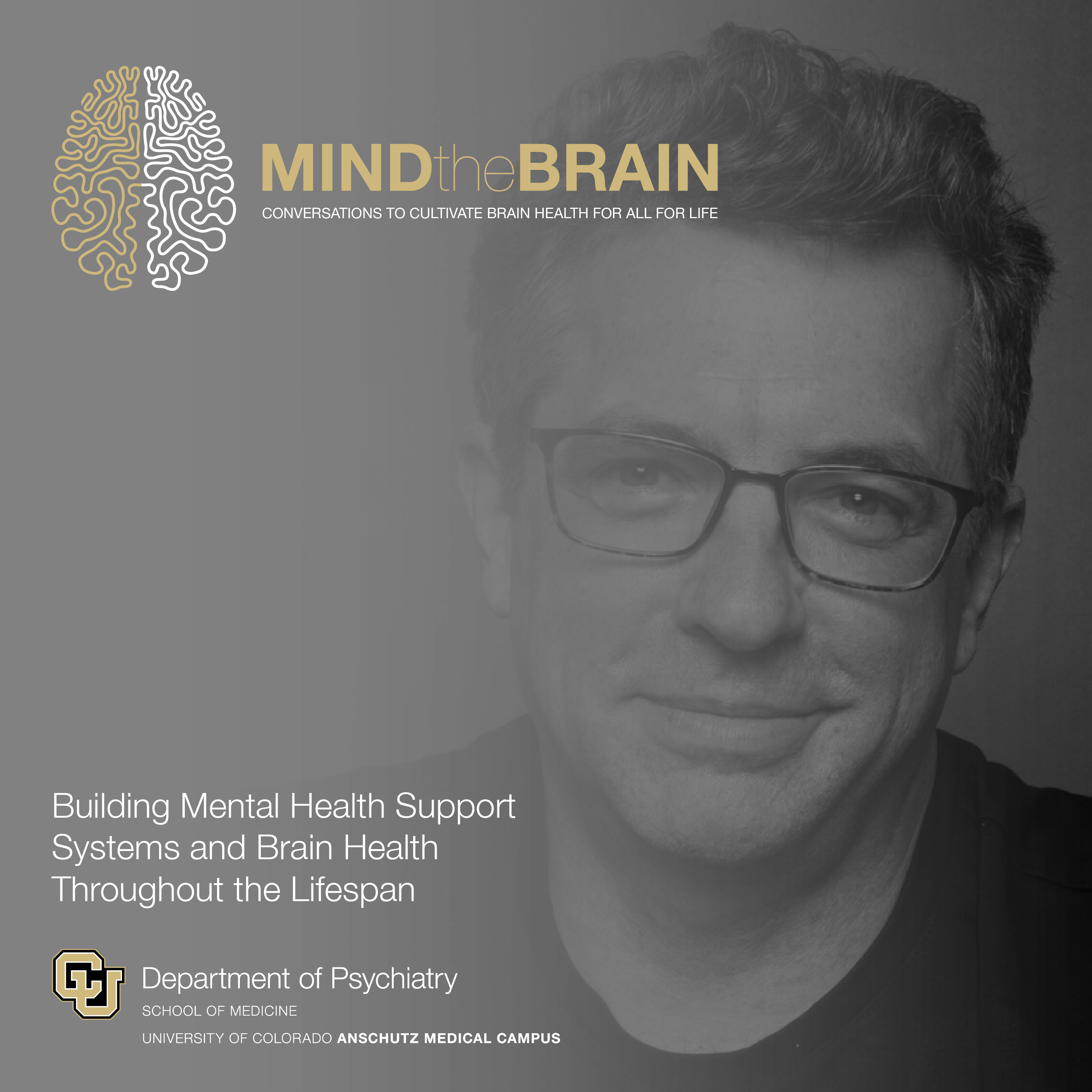Mind the Brain: Vincent Atchity on Building Mental Health Support Systems and Brain Health Throughout the Lifespan
May 18, 2021
Vincent Atchity is the President and CEO of Mental Health Colorado, the state affiliate of Mental Health America. His work in public health and health equity has included care management, cost control, outcomes improvement, workforce development, partnership network development, education, and fundraising. Vincent currently serves on the Colorado Public Defender Commission, the Governor’s Behavioral Health Task Force, the Denver District Attorney Advisory Council on Mental Health, the Colorado School of Public Health Behavioral Health Initiative Advisory Board, as well as on the board of a Federally Qualified Health Center (FQHC).
In this episode of Mind the Brain, Dr. Atchity and Dr. Neill Epperson discuss the need for advancing mental health support systems in our communities, as well as the many ways brain health is intimately linked to whole-person health and the ability to lead an abundant life.
What is Mental Health Colorado?
Atchity begins the interview with an overview of the mission and work of Mental Health Colorado. He explains that Mental Health Colorado works to promote mental well-being, increase access to quality care and services, and end discrimination associated with mental health and substance use conditions.
The organization is a consumer voice for Coloradans and has a network of advocates statewide who inform their policy work based on lived experiences as providers, patients, and patient advocates. In recent years they have been the driving force for passing important mental health legislation in Colorado providing citizens with greater access to care and funding for mental health programs.
Why mental health issues need taxpayer funding and policy reform
Dr. Epperson asks Vincent why mental health in comparison to other medical issues, needs to be addressed with policy reform, taxpayer dollars, philanthropic donations, and ballot initiatives, when other bodies of health aren’t seeking such support. Atchity says that unlike other medical conditions such as diabetes, mental health does not have the same extent of reliable coverage and traditional healthcare resources for people to turn to.
Mental health has innumerable impacts across our life span, such as the ability to earn money, our sense of self, how we interact with individuals around us, and how competent we feel at our jobs. Yet the lack of resources and support for issues that impact brain structure and function put so many people at risk of developing serious mental health issues that go untreated. Atchity emphasizes that we each have mental health, and no one is invulnerable to experiencing mental health issues and setbacks. So, building mental health resources and safety nets is a collective priority.
Mental health reform in the criminal justice system
The United States comprises only 5% of the world’s population but makes up for almost 25% of the world’s incarcerated population. Atchity discusses how these statistics reveal the criminal justice system to be "the most shameful and discriminatory aspect of our mental health landscape." Defaulting to law enforcement instead of appropriate clinical intervention results in a justice system filled with people who do not belong there and whom have a tremendous amount of unmet health needs.
Atchity is encouraged that Colorado has taken steps toward creating a justice system that better addresses mental health issues. There is a growing understanding amongst law enforcement to expand access to crisis intervention training to teach officers to recognize the signs of a mental health condition, and how to de-escalate and intervene in ways that don’t result in avoidable poor outcomes, including violence, and at worst, fatality. Other innovations in Colorado include co-responder models where police partner with clinicians, as well as Denver’s Star Program, a mobile outreach program that doesn’t involve law enforcement and has been extremely effective.
Atchity says de-escalation in crisis intervention brings us back to the concept that preventive care is so critical for all mental health. Communities and governments must invest in early childhood assessments, support parents who are struggling, and create safety nets that are truly safety nets for everyone, with narrow enough mesh to catch all who need it, including the most impoverished, and not just those who have the luck of landing in just the right place instead of plummeting straight through. Things like affordable housing, livable wage, and the ability to progress through life with systems in place to support us, should be a human right and can help support mental health across our lifespans.
Listen to the episode: Vincent Atchity on Building Mental Health Support Systems and Brain Health Throughout the Lifespan
For additional support, explore all of our mental health resources.
Mind the Brain CME Information:
CME Survey for the July 28, 2020 Edition
The University of Colorado School of Medicine is accredited by the Accreditation Council for Continuing Medical Education to provide continuing medical education for physicians.
The University of Colorado School of Medicine designates this internet enduring material activity for a maximum of 1 AMA PRA Category 1 CreditTM. Physicians should claim only the credit commensurate with the extent of their participation in this activity.